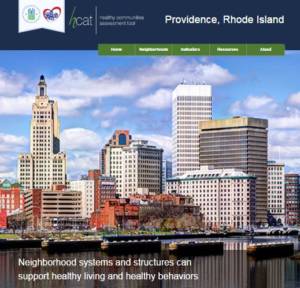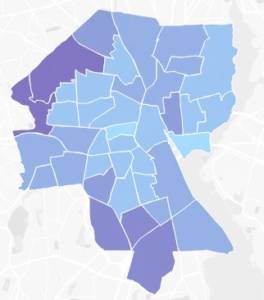Enrolling in Health Coverage
From July 2014 through December of 2015, the HCO directly assisted 1,873 residents to enroll in health coverage, including 1,431 new enrollments or re-enrollments of those who had lost coverage and 442 renewals. During this period, the number of Providence youth aged 19 and under enrolled in RIte Care (Medicaid and CHIP) rose by more than 4,000—from 28,894 to 32,971—according to the state Medicaid agency. This was achieved despite the challenges presented by the requirement that nearly all RIte Care enrollees enroll as if for the first time through the new HealthSource system. The HCO worked to reduce the burden of this process for low-income families. Most enrollees either had no gap in coverage or had a gap of just one month.
In 2016, the HCO facilitated the advancement of healthcare access between the Department of Human Services (DHS) and 11 American indigenous tribes from the Indigenous People’s Network of Massachusetts and Rhode Island.
<!–
Increasing Understanding of Health Data in Providence and Cities Nationwide
City Health Dashboard
In 2016, Providence was chosen to be one of four pilot cities in the Robert Wood Johnson Foundation’s Municipal-level Health Data for American Cities project. This project is creating a common framework for understanding and benchmarking cities’ standings in widely accepted indicators of health and creating guideposts to improve urban health nationwide. This project is led by the New York University School of Medicine’s Department of Population Health and NYU’s Robert F. Wagner School of Public Service, in partnership with the National Resource Network.
An online data visualization tool, the user-friendly website presents 26 measures related to health across the five areas: health outcomes, health behaviors, clinical care, social and economic factors, and physical environment.
 Healthy Communities Assessment Tool
Healthy Communities Assessment Tool
In the 2014-15, the Healthy Communities Office participated in the Healthy Communities Transformation Initiative funded by the US Department of Housing and Urban Development’s Office of Healthy Homes and Lead Hazard Control. The project collected and analyzed data regarding social determinants of health and disparities in these social determinants across Providence’s 25 neighborhoods. The Healthy Communities Assessment Tool provides a cumulative ranking of each neighborhood in Providence based on the Healthy Community Index core indicators of 37 social, economic, and physical factors important to community health. –>



